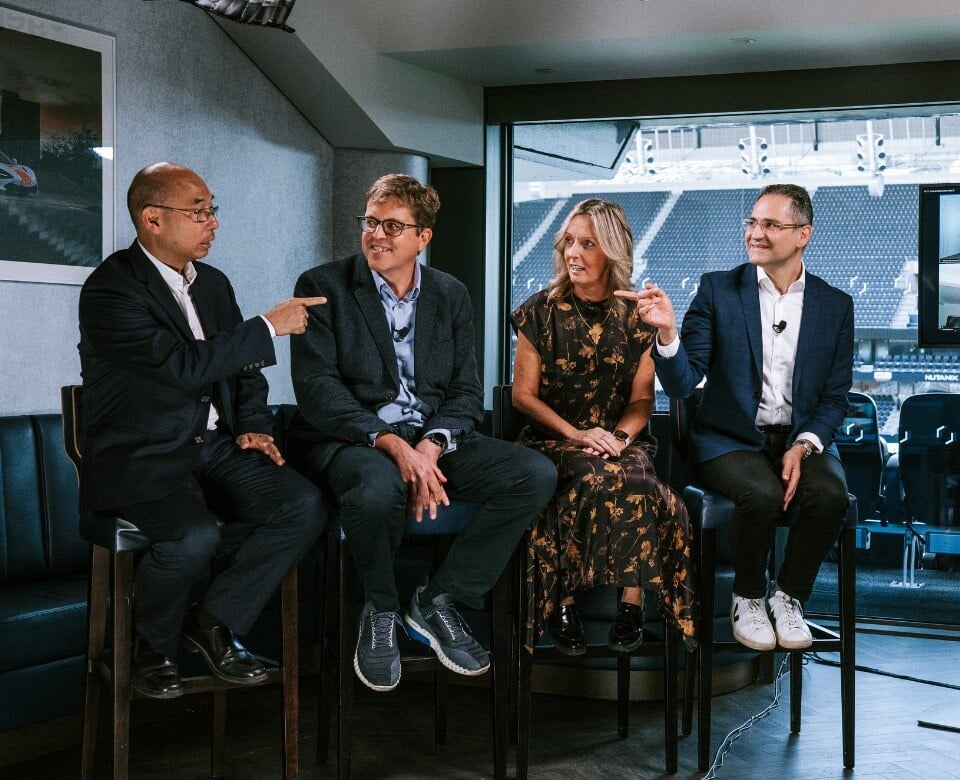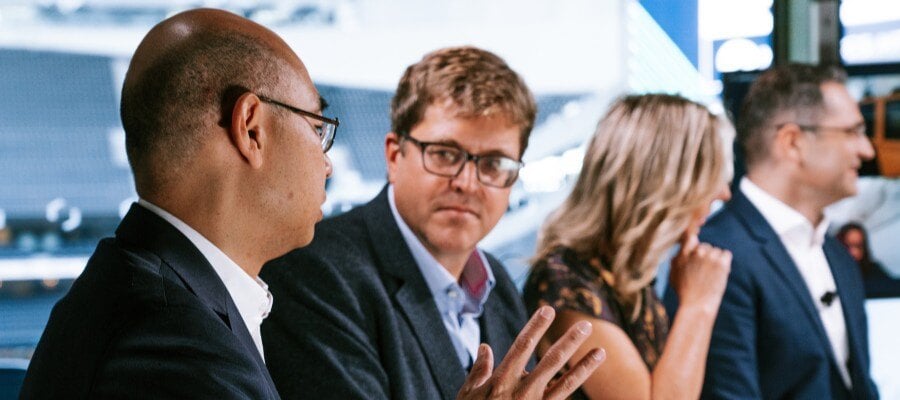
Navigating business towards a greener future
"Every change or aspiration for either a sustainable business growth or a sustainable business purpose starts with a great vision."
The journey towards a more sustainable business framework often begins with a vision. Sustainable leadership paves the way for decisions that consider the broader implications on society and the environment. In this article, renowned technology leaders share their strategies and insights on fostering a sustainable leadership approach.
Understanding sustainable leadership
Starting the conversation on sustainable leadership is the key to adopting a more responsible approach, according to business leaders. This includes considering the impact of business decisions and other actions on wider society and the environment. These technology leaders came together at The Studio to discuss their strategies on how to follow a more sustainable path. They also delve into what they would like to see happen in the wider industry to achieve these sustainable leadership goals.
Voices from the forefront of sustainable leadership
During a roundtable debate moderated by Sasha Qadri, distinguished tech leaders from various sectors delved into their strategies for sustainable leadership and their visions for the future. Participants included:
- Steen Dalgas, Senior Cloud Economist, Western Europe and Sub Saharan Africa, Nutanix
- Jacqui Lipinski, CIO, Director of Digital and Technical Services, Royal College of Art
- Freddie Quek, CTO, Times Higher Education
- Linda Rogers, CIO International, Life Healthcare Group
- Danny Attias, CDIO, London Business School
- Adrian Samareanu, Senior Advisor CDO, Ex-Volvo Financial Services
This roundtable was recorded at The Studio and made in partnership with Nutanix
The sustainable leadership path
Sasha Qadri began the debate by asking the technology leaders how they lead their businesses down a sustainable path.
London Business School’s CDIO, Danny Attias, stated that leaders need to: “Make sure the conversation is happening on the top table”. He argued that it’s not a technologist’s responsibility to bring the sustainability conversation to the table.
When Sasha asked him if it’s a struggle, he said: “It depends on the maturity of your organisation”. He outlined that the conversation could be about carbon offset or insulation and that would be the end of it. Danny stated it’s about “building the bigger picture” from all various components in the organisation. This could range from domestic policy to procurement policy.
Trying to navigate change is something leaders should focus on according to CIO and Director of Digital and Technical Services at Royal College of Art, Jacqui Lipinski.
She argued that people already know about sustainability: “It’s not new”. On the other hand, she said: “But trying to articulate how we need to make a change is quite difficult”. Jacqui added that there needs to be more conversations around how technology can help and what role it plays. “We need some of that transformation from a sustainability perspective”, she said.
Creating a new sustainability culture can be difficult according to CDO & Group SVP of Volvo Financial Services, Adrian Samareanu.
In order to start that journey, he believes companies need to get the basics right. “Every change or aspiration for either a sustainable business growth or a sustainable business purpose starts with a great vision”. He explained that it comes down to the maturity of the organisation. One example he offered is getting them to adopt and embrace digital. “Culture doesn’t change overnight”, he said.

Scopes 1, 2 and 3 emissions
Sasha steered the debate towards the topic of scope 1, 2 and 3 emissions, She asked the speakers if they have considered this in their plans.
“Scope 1 and 2 are relatively easy to measure”, said Steen. Senior Cloud Economist and Sustainability Program Leader at Nutanix, Steen Dalgas, argued that most of these are in control. On the other hand, he highlighted that for most organisations this can cause a lot of problems. Around 75 percent of these problems, according to Steen, stems from the supply chain.
He noted: “That’s going to take years to sort that out”, noting that everybody struggles.
Technology isn’t the key discussion point here according to Life Healthcare Group’s CIO, Linda Rogers. “How do we get the potential for that offering that technology can actually give”, she said. When talking about “who owns it”, Linda stated that her organisation’s view is that everyone does.
“Each of our staff has an ESG opportunity. They’ve gone off and done smart metering in their houses”, she said. Others have planted trees.
When looking at the sustainable leadership topic, Freddie argued that we all have a role to play. CTO at Times Higher Education, Freddie Quek agreed with Linda’s point about everyone being responsible for sustainability within the organisation. “Usually it’s more the technology department because they’ve been told it’s somebody else’s thing”, he said. He advised the speakers to start from an area that they have influence and control over. This is one of the first steps they need to take to start the conversation and “be part of the solution”.
Conclusion
Sustainable leadership is the cornerstone of modern, environmentally-conscious businesses. It's not just about greening operations; it's about steering entire organisations, through informed decisions and practices, towards a future where sustainability is at the heart of all actions.
This roundtable was recorded at The Studio and made in partnership with Nutanix. Watch the roundtable above to see the full discussion for ‘Sustainable leadership’.
SUBMIT A COMMENT
RELATED ARTICLES
Join the community
To join the HotTopics Community and gain access to our exclusive content, events and networking opportunities simply fill in the form below.
